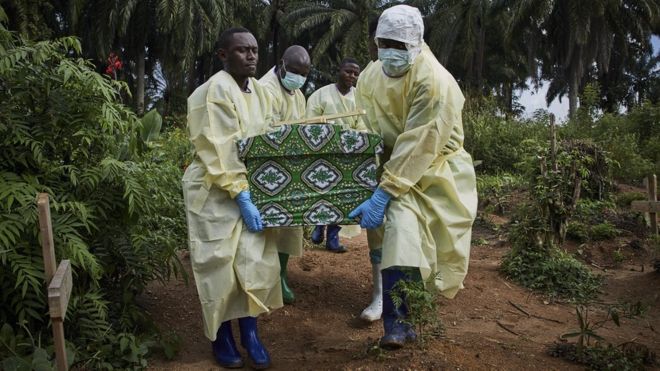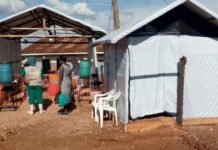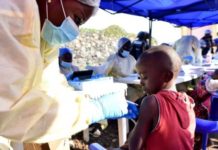
The numbers of people who have died in the current Ebola outbreak in the east of the Democratic Republic of Congo has reached the 2,000 mark, government figures show.
The health authorities have struggled to contain the spread of the virus.
Neighbouring Uganda said that a nine-year-old girl with Ebola who had crossed the border had died.
The World Health Organization has called the situation one of the world’s “most complex humanitarian crises”.
This outbreak, in the east of DR Congo, is the second largest on record with the number of cases now exceeding 3,000, according to the government.
The largest was the epidemic that ravaged parts of West Africa from 2014 to 2016, killing more than 11,000 people.
In Uganda, the girl with Ebola was isolated and transferred to an Ebola treatment unit where she later died. She is reported to have crossed the border with her mother, who was put into an isolation unit until she can be repatriated.
Uganda has maintained largely successful screening centres along its border with DR Congo in an effort stop the outbreak crossing the frontier.
There were two Ebola cases in the country in June. A Ugandan man and his Congolese wife lost two sons after their return from a trip to DR Congo to see relatives.
What is being done to control the outbreak?
In DR Congo, the health authorities, working with NGOs, have been vaccinating health workers and people who have been in contact with suspected Ebola cases, but it has been difficult getting the spread of the virus under control.
Insecurity in the east of DR Congo and people’s suspicions of treatments have hampered efforts.
About 200 health facilities have been attacked in the country this year, causing disruption to vaccinations and treatments. In one incident, family members assaulted health workers who were overseeing the burial of their relative.
A 2018 study published in the Lancet medical journal says “belief in misinformation was widespread” concerning the Ebola outbreak.
In a statement, the WHO called on countries and NGOs that have offered help to “increase their presence in the field to stop Ebola and to address one of the largest and most complex humanitarian crises in the world”.
How serious is the DR Congo outbreak?
The current outbreak in eastern DR Congo began in August last year and is the biggest of 10 to hit the country since 1976, when the virus was first discovered.
But it is dwarfed by the West African epidemic of 2014-16, which affected 28,616 people, mainly in Guinea, Liberia and Sierra Leone. About 11,310 people died in what was the largest outbreak of the virus ever recorded.
What is Ebola?
- Ebola is a virus that initially causes sudden fever, intense weakness, muscle pain and a sore throat
- It progresses to vomiting, diarrhoea and both internal and external bleeding
- People are infected when they have direct contact through broken skin, or the mouth and nose, with the blood, vomit, faeces or bodily fluids of someone with Ebola
- Patients tend to die from dehydration and multiple organ failure
Source: BBC




